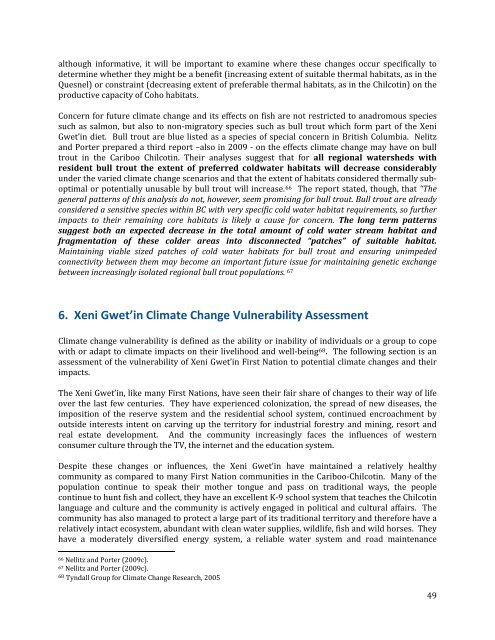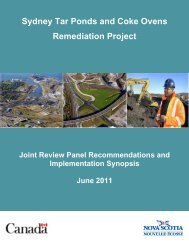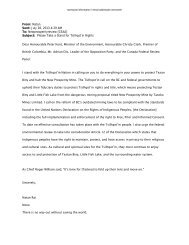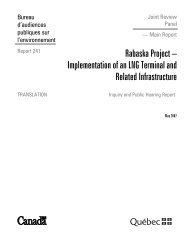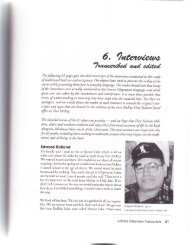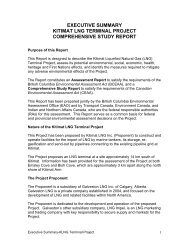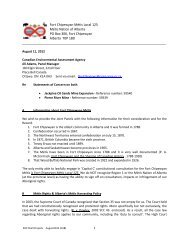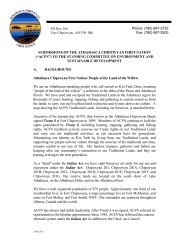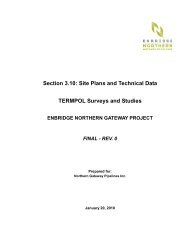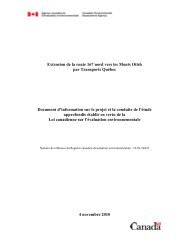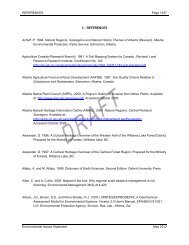From: on behalf of Panel Registry Subject: FW: TNG registration of ...
From: on behalf of Panel Registry Subject: FW: TNG registration of ...
From: on behalf of Panel Registry Subject: FW: TNG registration of ...
You also want an ePaper? Increase the reach of your titles
YUMPU automatically turns print PDFs into web optimized ePapers that Google loves.
although informative, it will be important to examine where these changes occur specifically to<br />
determine whether they might be a benefit (increasing extent <strong>of</strong> suitable thermal habitats, as in the<br />
Quesnel) or c<strong>on</strong>straint (decreasing extent <strong>of</strong> preferable thermal habitats, as in the Chilcotin) <strong>on</strong> the<br />
productive capacity <strong>of</strong> Coho habitats.<br />
C<strong>on</strong>cern for future climate change and its effects <strong>on</strong> fish are not restricted to anadromous species<br />
such as salm<strong>on</strong>, but also to n<strong>on</strong>‐migratory species such as bull trout which form part <strong>of</strong> the Xeni<br />
Gwet’in diet. Bull trout are blue listed as a species <strong>of</strong> special c<strong>on</strong>cern in British Columbia. Nelitz<br />
and Porter prepared a third report –also in 2009 ‐ <strong>on</strong> the effects climate change may have <strong>on</strong> bull<br />
trout in the Cariboo Chilcotin. Their analyses suggest that for all regi<strong>on</strong>al watersheds with<br />
resident bull trout the extent <strong>of</strong> preferred coldwater habitats will decrease c<strong>on</strong>siderably<br />
under the varied climate change scenarios and that the extent <strong>of</strong> habitats c<strong>on</strong>sidered thermally sub‐<br />
optimal or potentially unusable by bull trout will increase. 66 The report stated, though, that “The<br />
general patterns <strong>of</strong> this analysis do not, however, seem promising for bull trout. Bull trout are already<br />
c<strong>on</strong>sidered a sensitive species within BC with very specific cold water habitat requirements, so further<br />
impacts to their remaining core habitats is likely a cause for c<strong>on</strong>cern. The l<strong>on</strong>g term patterns<br />
suggest both an expected decrease in the total amount <strong>of</strong> cold water stream habitat and<br />
fragmentati<strong>on</strong> <strong>of</strong> these colder areas into disc<strong>on</strong>nected “patches” <strong>of</strong> suitable habitat.<br />
Maintaining viable sized patches <strong>of</strong> cold water habitats for bull trout and ensuring unimpeded<br />
c<strong>on</strong>nectivity<br />
between them may become an important future issue for maintaining genetic exchange<br />
between<br />
increasingly isolated regi<strong>on</strong>al bull trout populati<strong>on</strong>s. 67<br />
6. Xeni Gwet’in Climate Change Vulnerability Assessment<br />
Climate change vulnerability is defined as the ability or inability <strong>of</strong> individuals or a group to cope<br />
with or adapt to climate impacts <strong>on</strong> their livelihood and well‐being68. The following secti<strong>on</strong> is an<br />
assessment<br />
<strong>of</strong> the vulnerability <strong>of</strong> Xeni Gwet’in First Nati<strong>on</strong> to potential climate changes and their<br />
impacts.<br />
The Xeni Gwet’in, like many First Nati<strong>on</strong>s, have seen their fair share <strong>of</strong> changes to their way <strong>of</strong> life<br />
over the last few centuries. They have experienced col<strong>on</strong>izati<strong>on</strong>, the spread <strong>of</strong> new diseases, the<br />
impositi<strong>on</strong> <strong>of</strong> the reserve system and the residential school system, c<strong>on</strong>tinued encroachment by<br />
outside interests intent <strong>on</strong> carving up the territory for industrial forestry and mining, resort and<br />
real<br />
estate development. And the community increasingly faces the influences <strong>of</strong> western<br />
c<strong>on</strong>sumer culture through the TV, the internet and the educati<strong>on</strong> system.<br />
Despite these changes or influences, the Xeni Gwet’in have maintained a relatively healthy<br />
community as compared to many First Nati<strong>on</strong> communities in the Cariboo‐Chilcotin. Many <strong>of</strong> the<br />
populati<strong>on</strong> c<strong>on</strong>tinue to speak their mother t<strong>on</strong>gue and pass <strong>on</strong> traditi<strong>on</strong>al ways, the people<br />
c<strong>on</strong>tinue to hunt fish and collect, they have an excellent K‐9 school system that teaches the Chilcotin<br />
language and culture and the community is actively engaged in political and cultural affairs. The<br />
community has also managed to protect a large part <strong>of</strong> its traditi<strong>on</strong>al territory and therefore have a<br />
relatively intact ecosystem, abundant<br />
with clean water supplies, wildlife, fish and wild horses. They<br />
have a moderately diversified<br />
energy system, a reliable water system and road maintenance<br />
66 Nellitz and Porter (2009c).<br />
67 Nellitz and Porter (2009c).<br />
68 Tyndall Group for Climate Change Research, 2005<br />
49


